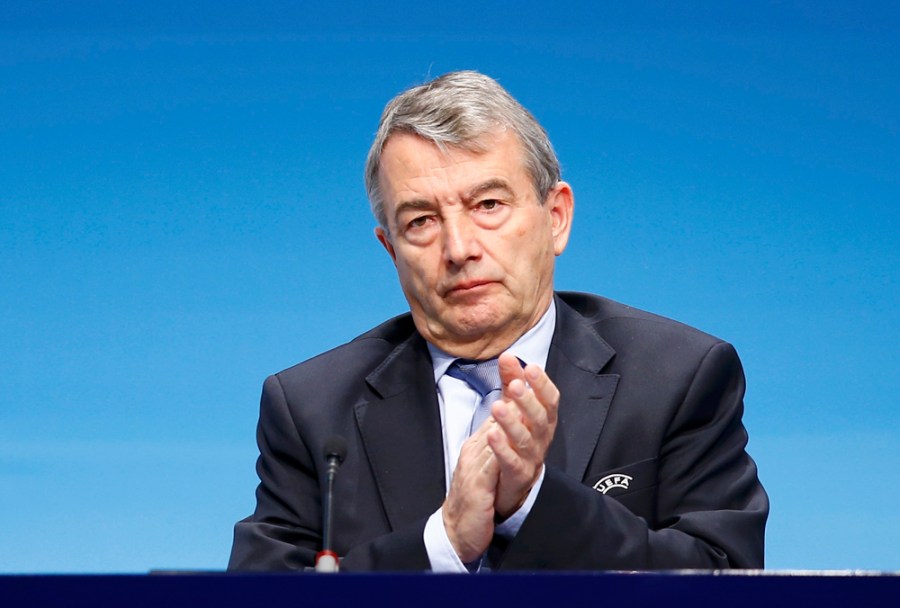German football president Wolfgang Niersbach has demonstrated in an open letter precisely why the rest of the world will be wary about electing a European successor to Sepp Blatter.
Niersbach, head of the Deutscher Fussball-Bund since 2012, is a member of the UEFA executive committee and, since last month, also on the governing body of world federation FIFA.
Last year he was strident in complaining that Blatter was breaking a promise to stand down as head of the world federation. Since Blatter’s announcement of impending departure, Niersbach has demanded, so far in vain, that the 79-year-old Swiss should quit with immediate effect.
Niersbach has expressed his concerns about the swirling FIFA corruption crisis in an open letter on the DFB website to the 6.8m players, officials and members of the German football family. He listed a 10-point plan to address some of FIFA’s ills.
The one which will most concern football associations beyond Europe was his proposal to end the ‘one country one vote’ system used to enact all decisions in FIFA’s annual congress. By this means the vote of, say, Turks & Caicos with a 31,000 population and one of the world’s smallest nations, is exactly equal in FIFA weight to that of Germany or Russia.
This provided Blatter with much of his power of patronage through development grants which mean far more to small nations than established ones – and guaranteed him widespread support.
Niersbach acknowledged: “Football must respect every opinion and perspective.” However he continues: “A comprehensive reform should examine whether the current system of ‘one country one vote’ should be adapted and developed.
“In principle, I support democratic participation but I also believe it would be effective to put in place a certain amount of weighted voting based on the size and the significance of associations.”
This harks back to the mid-1960s when a number of European associations grew concerned at the number of newly-independent nations from the developing world applying to join FIFA. They feared that their tradition power over the world game would be diluted and, eventually, wiped out.
However Sir Stanley Rous, England’s then president of FIFA, insisted that ‘one country one vote’ was the only democratic way to go. The stance backfired on him when Brazilian Joao Havelange canvassed crucial support among FIFA’s new nations to oust Rous in 1974.
Inevitably Niersbach’s resurrection of the ‘weighted vote’ concept will raise hackles among smaller nations beyond Europe which already resent what they consider a UEFA-led campaign to oust Blatter.
Niersbach describes himself in his letter as having been “stunned” and “shocked” by events at FIFA which was suffering “its most severe crisis.”
He added: “Everything that makes up our wonderful game is at stake. We need a respected, high-integrity football government at the top for the sake of the credibility of every volunteer, every player and every fan. The evidence of the personal enrichment by some officials has left me just as stunned as every ordinary club representative.
“FIFA not only requires a speedy change of personnel at the top. It needs more control, more transparency. It needs reliability, seriousness and liability.
“I am not so naive as to think that the DFB can reform everything all its own. This demands international alliances and majorities, which are difficult to achieve. Even the largest association of FIFA has only one vote, which will not be heard in every part of the world. But we see it as our task to raise our voice.”
He also justified his continuance on the FIFA exco “so that we can bring forward our ideas for the only way to a better FIFA.” This contrasted with the refusal of new British vice-president David Gill to take up his seat while Blatter remained as president.
Niersbach’s 10-point plan of ideas for FIFA reform included:
1, Change at the top of FIFA: With all due respect for his life’s work Sepp Blatter does FIFA and the entire football no favours by postponing his resignation”;
2, investigating all allegations of corruption: Corruption has no place in football; criminal activities must be systematically detected and punished; FIFA must cooperate fully with the investigating authorities. It must be possible to evaluate all fraudulent circumstances completely legally. Dealing effectively with the past is a precondition for renewed confidence in the organisation;
3. Establishment of wider integrity checks, undertaken by an independent body and/or the ethics committee before elections to the exco;
4. Election of the executive committee members by Congress not the confederations;
5, term limits, to limit the power of patronage of individuals, with a maximum of 12 years, as per the IOC, for the president of FIFA;
6, Transparency in World Cup award which follows the technical evaluation (Had FIFA applied this method, Qatar would not have been selected);
7. Human rights: Freedom of expression, press freedom, the protection of minorities, tolerance and respect are essential and upholding workers’ rights and safety standards by the candidate country must be taken into account in World Cup bid assessments;
8. Control of cash flow: FIFA promotes many projects in the world which do a lot of good but must ensure such programmes do not enrich unscrupulous individuals at the expense of football;
9. Adjustment of the voting system (as above);
10 An extraordinary FIFA Congress should authorize a reform agenda and a timeline for its implementation.
Niersbach added: “It is sad how greed and lack of morals by a few have placed all of football under general suspicion. My 10 points do not claim to be the solution to all FIFA’s problems. But they are a serious attempt at a start.”







